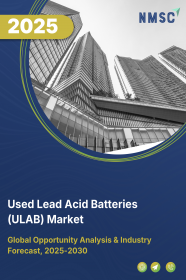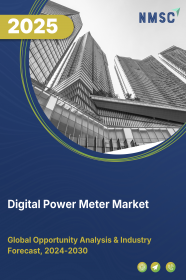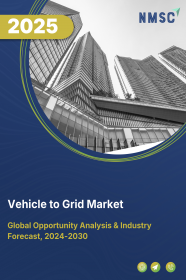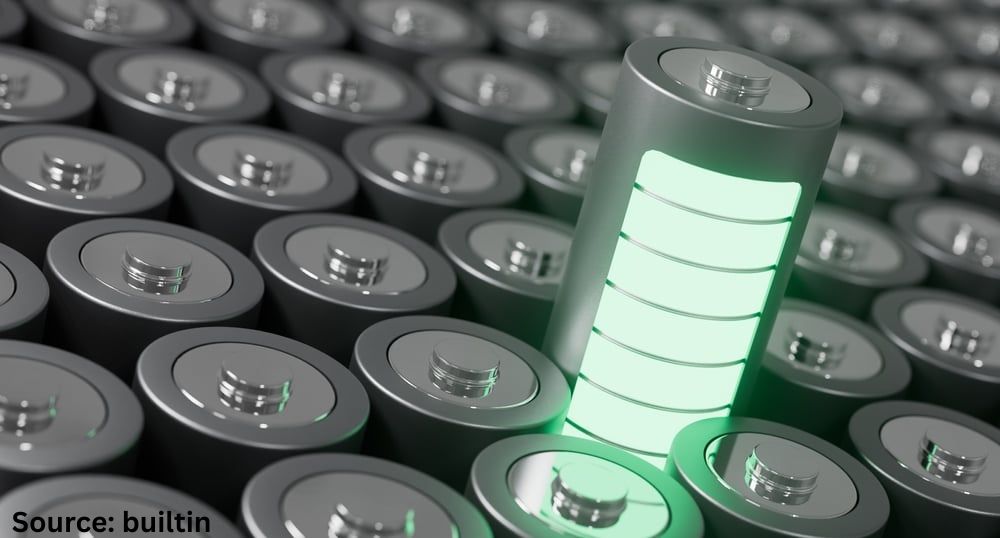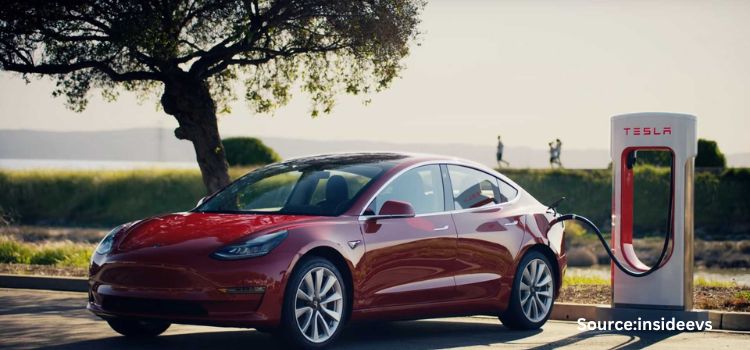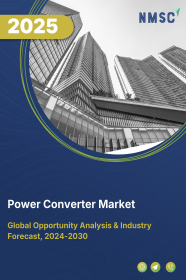
Power Converter Market by Power Type (AC to DC, DC to AC, DC to DC, and AC to AC), by Cooling Type (Natural Cooling, Forced Air Cooling, and Liquid Cooling), by Power Range (Below 1 kW, 1-10 kW, 10-100 kW, and Above 100 kW), by Topology (Half-Bridge, Full-Bridge, and Push-Pull), by Application (Industrial Automation, Renewable Energy, Medical Devices, and Automotive), and by End Users (Residential, Commercial, and Industrial) – Global Opportunity Analysis and Industry Forecast, 2025– 2030
US Tariff Impact on Power Converter Market
Trump Tariffs Are Reshaping Global Business
Power Converter Market Overview
The global Power Converter Market size was valued at USD 20.65 billion in 2024 and is predicted to reach USD 31.21 billion by 2030 with a CAGR of 7.1% from 2025-2030.
The factors such as the increasing solar power generation, rising electricity demand, and expansion of industrialization drives the growth of the market. However, high initial cost associated with power converter serves as a significant restraint for the market. On the contrary, the integration of smart grid technology in power converters is expected to create significant growth opportunities in the coming years.
Moreover, the top market players including ABB Ltd., Honeywell International Inc. and Schneider Electric SE use various strategies such as acquisition, product launch and partnership to strengthen their position and improve product range. The initiatives concentrate on advancing technologies for power conversion systems while promoting innovative installations, boosting energy efficiency and reliable system operation. As the market develops, the increasing focus on renewable energy solutions and smart energy infrastructure is expected to propel growth and foster widespread adoption across various sectors.
Increasing Solar Power Generation Fuels the Market Growth
The rising solar power generation fuels the growth of the market due to the implementation of renewable energy systems that requires efficient power conversion mechanisms. The expanding amount of solar panel global deployments creates a requirement for power converters that convert solar panel direct current (DC) to alternating current (AC) for instant electricity grid compatibility.
Statistical Review of World Energy (2024) published by the Energy Institute reports that solar power production expanded from 853.4 TWh in 2020 to 1,629.9 TWh in 2023 representing a 91% rise within a time span of 3 years. The substantial growth in solar power generation accelerates the need for energy converters as it important to maintain reliable electricity supply.
Rising Electricity Demand Drives the Growth of the Market
The rising electricity demand drives the growth of the market due to the increasing need for efficient power management and grid stability. The shift in consumption patterns and the increase in peak loads create a demand for advanced power converters among utilities and industries to optimize energy distribution and enhance performance.
According to the latest report published by the Sandbag Climate Campaign CIC, the global electricity demand rose from 26,654.8 TWh in 2020 to 29,479 TWh in 2023, marking a growth of 10.6% over a period of 3 years. This increase in electricity demand leads to the adoption of innovative power conversion technologies that enables more reliable energy solutions, thereby accelerating power converter market demand.
Expansion of Industrialization Propels the Market Expansion
The market growth is driven by the expansion of the industrial sector as it increases need for effective energy management systems. As manufacturing industries depend on power conversion systems to maximize their energy efficiency while minimizing expenditures and boosting production quantity.
The United Nations Industrial Development Organization (UNIDO) report indicates that in 2023 industrial sectors including manufacturing and mining alongside others increased at a rate of 2.3% worldwide. This increase in industrial activity emphasizes the essential role of power converters in meeting the energy requirements of growing industrial operations that in turn drives the power converter market expansion.
High Initial Cost Hinders the Market Growth
The high initial cost associated with power converter serves as a significant restraint. These substantial expenses deter small and mid-sized enterprises from investing in advanced technologies, limiting their position and hindering overall power converter market growth.
Integration of Smart Grid Technology Creates a Future Opportunity for the Market
The integration of smart grid technology in power converters is expected to create significant growth opportunities in the coming years. This integration enhances grid reliability and efficiency by enabling real-time communication and control, optimizing energy distribution, and facilitating renewable energy integration.
Market Segmentations and Scope of the Study
The power converter market report is segmented on the basis of power type, cooling type, power range, topology, application, end users, and region. On the basis of power type, the market is divided into AC to DC, DC to AC, DC to DC, and AC to AC. On the basis of cooling type, the market is distributed into natural cooling, forced air cooling, and liquid cooling. On the basis of power range, the market is classified into below 1 kW, 1-10 kW, 10-100 kW, and above 100 kW. On the basis of topology, the market is segmented into half-bridge, full-bridge, and push-pull. On the basis of application, the market is classified into industrial automation, renewable energy, medical devices, and automotive. On the basis of end users, the market is distributed into residential, commercial, and industrial. The regional breakdown includes regions such as North America, Europe, Asia-Pacific, and the Rest of the World (RoW).
Geographical Analysis
Asia-Pacific dominates the power converter market share and is projected to maintain its dominance throughout the forecast period. This is attributed to the rise in solar power generation that boosts the demand for efficient power conversion systems that facilitate the integration of renewable energy sources into the grid in the region.
As per the latest report published by the Energy Institute - Statistical Review of World Energy (2024), India’s solar power generation increased from 58.68 TWh in 2020 to 113.41 TWh in 2023, marking a 93% growth within a time span of 3 years. This significant growth in solar energy production highlights the importance of electrical energy converter in facilitating seamless energy integration and supporting the region's shift to renewable energy.
Moreover, the adoption of electric vehicle in the region fuels the market growth due to the rising demand for better energy management systems along with advanced charging infrastructure solutions. The evolution of power quality inside EV systems depends heavily on these power converters for both performance excellence and energy efficiency. The International Energy Agency published a recent report showing that China's electric vehicle car sales increased from 6 million vehicles in 2022 to 8.1 million in 2023, reflecting a growth of 35%. Thus, this surge in EVs sales drives requirements for high-end power conversion solutions to back sustainable transportation systems that in turn accelerates the market growth.
On the other hand, North America region is expected to show a steady rise in the power converter industry. This is due to the increasing demand for electricity in countries such as the U.S., Canada and Mexico that requires improved electrical energy management solutions for effective regulations and conversions and efficient distribution to support dependable supply networks throughout different industry sectors.
According to the Sandbag Climate Campaign CIC report, the U.S. electricity consumption increased from 4,090.5 TWh in 2020 to 4,266.7 TWh in 2023 with a rise of 4.3 percent within a time span of three years. The rising electricity requirements stimulate new advancements in energy management solutions that supports developing needs.
Also, the presence of key players such as Honeywell International Inc., Emerson Electric Co., and Advanced Energy Industries Inc. through their product launch. The company focuses on building high-tech electrical energy converters that boost power efficiency and enable renewable energy integration in energy networks.
For instance, in April 2024, Advanced Energy launched Evergreen, a next-generation modular power converter platform designed for high-power AC-DC conversion. This platform meets the growing demands for efficiency and flexibility, particularly as renewable energy sources gain traction. Such innovations play a crucial role in advancing the market and addressing changing energy requirements.
Competitive Landscape
The power converter industry comprises of various key market players such as ABB Ltd., Honeywell International Inc., Schneider Electric SE, Rockwell Automation, Inc., Siemens AG, Fuji Electric Co., Ltd., Makita Corporation, RECOM Power GmbH, Delta Electronics, Inc., Efficient Power Conversion Corporation, Bel Fuse Inc., Crane Aerospace & Electronics, STMicroelectronics NV, Vishay Intertechnology, Inc., Infineon Technologies AG, and others. These market players continue to adopt various market development strategies including acquisition, product launch, and partnership to maintain their dominance in the market.
For instance, in September 2024, RECOM Power acquired LECO to strengthened its position in the power electronics. This strategic move aims to enhance RECOM's product range and expertise, particularly in custom and standard power conversion solutions designed for critical industrial automation sectors.
Also, in April 2024, Fuji Electric introduced the HPnC series, a line of large-capacity industrial IGBT (insulated-gate bipolar transistor) modules designed to enhance power conversion for renewable energy applications. These modules are intended for use in power conditioning systems (PCSs) for solar and wind energy generation.
Additionally, in January 2024, Efficient Power Conversion partnered with BrightLoop Converters to advance power conversion technology. This collaboration leads to the development of smaller, lighter converters that significantly impact sectors such as eMotorsport and emerging markets.
Key Benefits
-
The report provides quantitative analysis and estimations of the power converter industry from 2025 to 2030, which assists in identifying the prevailing industry opportunities.
-
The study comprises a deep-dive analysis of the current and future power converter market trends to depict prevalent investment pockets in the industry.
-
Information related to key drivers, restraints, and opportunities and their impact on the power converter industry is provided in the report.
-
Competitive analysis of the key players, along with their market share is provided in the report.
-
SWOT analysis and Porters Five Forces model is elaborated on the study.
-
Value chain analysis in the market study provides a clear picture of roles of stakeholders
Power Converter Market Key Segments
By Power Type
-
AC to DC
-
DC to AC
-
DC to DC
-
AC to AC
By Cooling Type
-
Natural Cooling
-
Forced Air Cooling
-
Liquid Cooling
By Power Range
-
Below 1 kW
-
1-10 kW
-
10-100 kW
-
Above 100 kW
By Topology
-
Half-Bridge
-
Full-Bridge
-
Push-Pull
By Application
-
Industrial Automation
-
Renewable Energy
-
Medical Devices
-
Automotive
By End Users
-
Residential
-
Commercial
-
Industrial
By Region
-
North America
-
The U.S.
-
Canada
-
Mexico
-
-
Europe
-
The UK
-
Germany
-
France
-
Italy
-
Spain
-
Denmark
-
Netherlands
-
Finland
-
Sweden
-
Norway
-
Russia
-
Rest of Europe
-
-
Asia-Pacific
-
China
-
Japan
-
India
-
South Korea
-
Australia
-
Indonesia
-
Singapore
-
Taiwan
-
Thailand
-
Rest of Asia-Pacific
-
-
RoW
-
Latin America
-
Middle East
-
Africa
-
Key Players
-
ABB Ltd.
-
Honeywell International Inc.
-
Schneider Electric SE
-
Rockwell Automation, Inc.
-
Siemens AG
-
Fuji Electric Co., Ltd.
-
Makita Corporation
-
RECOM Power GmbH
-
Delta Electronics, Inc.
-
Efficient Power Conversion Corporation
-
Bel Fuse Inc.
-
Crane Aerospace & Electronics
-
STMicroelectronics NV
-
Vishay Intertechnology, Inc.
-
Infineon Technologies AG
REPORT SCOPE AND SEGMENTATION:
|
Parameters |
Details |
|
Market Size in 2024 |
USD 20.65 Billion |
|
Revenue Forecast in 2030 |
USD 31.21 Billion |
|
Growth Rate |
CAGR of 7.1% from 2025 to 2030 |
|
Analysis Period |
2024–2030 |
|
Base Year Considered |
2024 |
|
Forecast Period |
2025–2030 |
|
Market Size Estimation |
Billion (USD) |
|
Growth Factors |
|
|
Countries Covered |
28 |
|
Companies Profiled |
15 |
|
Market Share |
Available for 10 companies |
|
Customization Scope |
Free customization (equivalent up to 80 working hours of analysts) after purchase. Addition or alteration to country, regional, and segment scope. |
|
Pricing and Purchase Options |
Avail customized purchase options to meet your exact research needs. |

















 Speak to Our Analyst
Speak to Our Analyst



